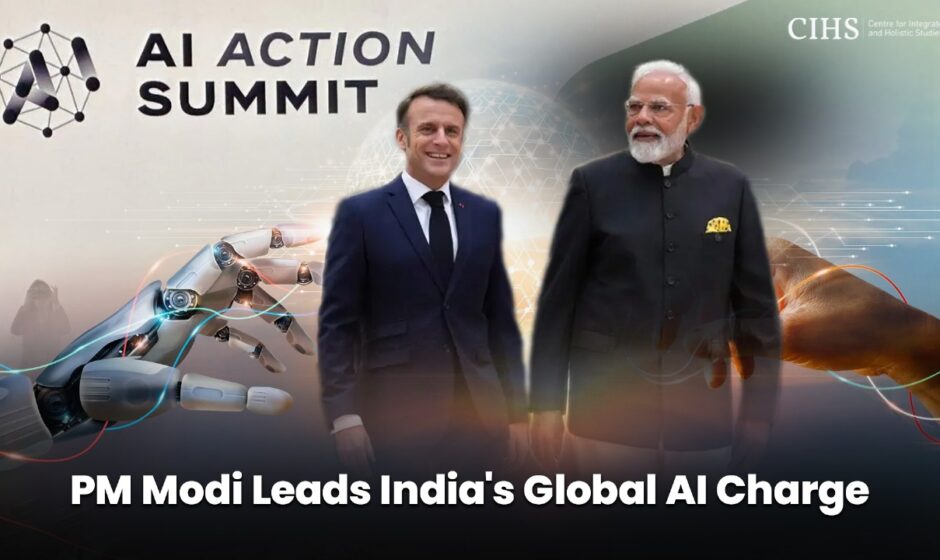Rahul Pawa
When the next AI Summit convenes, it will be on Indian soil, in a country that is scripting its own AI destiny one built on access, equity, and innovation.
In the heart of Paris, under the ornate ceilings of the Grand Palais, the world witnessed a pivotal moment in technological history. The AI Action Summit, co-chaired by French President Emmanuel Macron and Indian Prime Minister Narendra Modi, convened global leaders, tech magnates, and policymakers to chart the future of artificial intelligence (AI). The two-day summit, held against the backdrop of rapid technological advancements, became a stage where India positioned itself not just as a participant but as a formidable force in the global AI ecosystem.

Prime Minister Modi, in his opening address, eloquently stated, “We are at the dawn of the AI age, where this technology is fast writing the code for humanity and reshaping our polity, economy, security, and society.” He emphasised the unparalleled impact of AI, urging collective global efforts to establish governance frameworks that uphold shared values, address inherent risks, and build trust among nations. Governance, he asserted, was not merely about risk management but about fostering an environment where innovation could thrive, ensuring AI’s benefits reach all, particularly the so called “Global South”.
As the summit unfolded, world leaders laid out their stakes in the AI race. French President Emmanuel Macron made a bold statement, unveiling a €109 billion investment in France’s AI sector. With characteristic flair, he highlighted France’s clean energy advantage, stating, “Here, there is no need to drill. It’s plug, baby, plug.” His words highlighted the urgency of aligning AI innovation with sustainable infrastructure, a challenge that nations around the world are grappling with. Meanwhile, U.S. Vice President JD Vance struck a different tone, advocating a laissez-faire approach to AI development. He warned against overregulation, suggesting that excessive oversight could stifle innovation. “We must allow AI to evolve freely, driven by market forces rather than bureaucratic constraints,” he remarked, in sharp contrast to Europe’s push for tighter AI governance.
The European Commission’s President Ursula von der Leyen, however, took a measured stance, emphasizing the need for responsible AI development. “AI must be an enabler, not a disruptor. We must strike the right balance between innovation and ethics, ensuring technology serves humanity, not the other way around,” she stated, reinforcing the bloc’s commitment to structured AI oversight. Amid these competing visions, it was Modi’s announcement that India would host the next AI Summit that sent a resounding message. India, he declared, was not content with being a consumer of AI but was determined to be a key architect of its future. With its vast population, diverse linguistic landscape, and thriving tech ecosystem, India offered a unique testing ground for AI models that could be scaled globally.
The timing of Modi’s announcement was strategic. Just last year, the Indian Cabinet had approved an ambitious ₹10,300 crore outlay for the IndiaAI Mission, a sweeping initiative designed to cement the country’s position as a global AI powerhouse. This mission, spanning the next five years, aims to build a robust AI infrastructure, develop indigenous AI models, and foster innovation through public-private partnerships. A key pillar of this initiative is the IndiaAI Compute Capacity, a scalable infrastructure deploying over 10,000 Graphics Processing Units (GPUs) to power AI research and applications. India’s AI ambitions extend beyond infrastructure. The IndiaAI Innovation Centre (IAIC) is set to become a hub for cutting-edge AI research, focusing on developing Large Language Models (LLMs) tailored to India’s linguistic multiplicity. The initiative will also enhance the IndiaAI Datasets Platform, ensuring access to high-quality, bias-free datasets critical for developing fair and accurate AI systems.
As Modi took the stage once again to discuss the ethical challenges of AI, his message was clear—AI must be transparent, inclusive, and free from biases that perpetuate social inequalities. “We must build quality data sets, free from biases. We must democratise technology and create people-centric applications. We must address concerns related to cybersecurity, disinformation, and deep fakes. And we must also ensure that technology is rooted in local ecosystems for it to be effective and useful,” he emphasised.
Bias in AI, he warned, was one of the most pressing concerns of the modern era. From image recognition systems that favour Western-centric depictions to healthcare AI models that perform poorly on non-white populations, the risks were vast. “Ask AI to generate an image of a person writing with their left hand, and it is likely to depict a right-handed writer instead, because right-handed examples dominate its training data,” he explained, offering a simple yet profound example of how deeply embedded biases can shape AI’s outputs.
The urgency of ethical AI governance was emphasised by the presence of Chinese Vice Premier Zhang Guoqing, a stark reminder of the geopolitical stakes in AI supremacy. China’s aggressive AI push, underpinned by vast data pools and state-controlled development, has raised concerns among Western nations about the implications of an AI arms race. In contrast, India positioned itself as a neutral player—advocating for open-source AI models, transparency, and global cooperation to ensure AI serves humanity at large. As the summit concluded, a new global AI landscape had begun to take shape—one where India was no longer on the periphery but at the forefront of shaping policies, driving innovation, and ensuring ethical governance. When the next AI Summit convenes, it will be on Indian soil, in a country that is scripting its own AI destiny—one built on access, equity, and innovation. In the words of Prime Minister Modi, “The future of AI must be inclusive, just as the future of humanity must be inclusive. Let us build it together.”
(Author is Research Director at Centre for Integrated and Holistic Studies, New Delhi based non-partisan think-tank)



